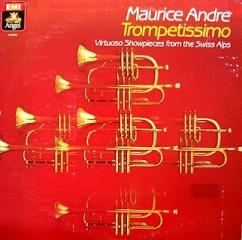Maurice Andre - Trompetissimo! (1983)
Maurice Andre - Trompetissimo! (1983)

Side One (20:39): 1. Trompetissimo play 2. Gouttes D'eau (Drops of Water) 3. Le corso blanc 4. Fions flons champetres (The Band in the Country) 5. Komm, Karlineken 6. Kuckuckswaizer (Cuckoo Waltz) 7. Be Bop 1900 8. Les saltimbanques (The Acrobats) Side Two (20:31): 9. Perles de cristal (Pearls of Crystal) 10. La czarine 11. La mattchiche 12. Vive L'Auvergne 13. Im Salzkammergut 14. Les gais virtuoses (The Merry Virtuosos) 15. Joli coeur (Pretty Heart) 16. Fanfare valse play Maurice Andre – trumpet Maurice André, trumpeter, born 21 May 1933; died 25 February 2012
At the height of his career, the name of Maurice André, who has died at the age of 78, was synonymous with the trumpet. Not only was he largely responsible for establishing the trumpet as a popular solo instrument, but he also dominated the scene in the 1960s and 70s with a punishing schedule of concerts (an average of 180 a year) and more than 300 recordings, many made on his trademark piccolo trumpet.
As the winner of a prestigious international competition in Munich in 1963, he was sought out by the conductor Karl Richter, who needed a player with star quality for the taxing trumpet parts of such works as Bach's B Minor Mass. Other notable conductors with whom André worked at this time included Karl Böhm, Karl Münchinger and Herbert von Karajan. He made an immensely successful recording with Karajan of a transcribed concerto by Vivaldi.
It was the lack of repertoire for the trumpet that persuaded André to make arrangements of works for violin, oboe and other instruments. He played them on the piccolo trumpet, an instrument designed to deliver the higher range with facility, and proceeded to stun audiences with a winning combination of technical brilliance and sweetness of tone. André was a big man, with bushy eyebrows and fleshy fingers. Often the tiny instrument seemed to disappear from view beneath his hands. But he was a huge inspiration to generations of trumpeters, not least his pupils at the Paris Conservatoire, where he taught from 1967 to 1978. He continued to tour after that, first with his brother Raymond, also a trumpeter, and later with his children Nicolas and Béatrice (trumpeter and oboist respectively). His farewell concert took place in 2008 in St Nazaire Cathedral, Béziers, in southern France, by which time André was officially in retirement. He had moved to a hilltop villa in the Basque country, where he developed his talents as a woodcarver and painter, but continued to practise the trumpet for four or five hours a day.
Born in Alès, France, at the foot of the Cévennes mountains, André was the son of a coalminer who was also an amateur trumpet player. His father presented the 12-year-old André with a cornet and was so impressed by the boy's potential that he sent him to study with a friend of his, Léon Barthélémy, a former student at the Paris Conservatoire. Having taught André for four years, Barthélémy urged his father to send the boy, who had in the meantime followed his father down the mine, to study at the Conservatoire. Since the family could not afford the fees, André joined a military band, enabling him to secure a free place there. He studied with Raymond Sabarich, receiving first prize for both cornet and trumpet after his first and second years of study. His early orchestral posts were with the Lamoureux Orchestra (1953-60), the Radio France Philharmonic Orchestra (1953-62) and the Opéra-Comique (1962-67), but his success in the Munich competition effectively launched his career as a soloist. He had in fact been invited to sit on the jury of the competition, but decided to participate himself. It was at this time that he met and married his wife, Liliane, who supported him loyally as manager and companion on his tours, not least in the early years when his career was slow to take off.
André's eventual success was founded on a solid technique, superb breath control and seemingly inexhaustible stamina, attributed by him to his years in the coalmine: "I built myself up when working in the mine at 14 years old, when I was moving 17 tons of coal a day," he once said. Certainly the technique was formidable. Playing a three-valve Selmer instrument (a fourth valve was added by the manufacturer in 1967 in collaboration with André to extend the register downwards), he effortlessly negotiated the stratospheric pitch range for which the Baroque repertoire was notorious. In the virtuoso faster movements, his tone sparkled brilliantly; in the slow movements it was creamy and seductive. As Karajan once opined: "He's undoubtedly the best trumpet player, but he's not from our world." Since the 1970s, Baroque performance practice has developed considerably, with more variety of phrasing and articulation. Both soloist and orchestral accompaniments on many of André's recordings now sound inflexible, with dirge-like tempi for slow movements. But at the time, this style of playing was thrillingly new and original. It was his lesser-known predecessor Adolf Scherbaum who introduced the piccolo trumpet and its repertoire, but André who brought it global popularity.
Though André was far from a devotee of contemporary music, the sound of which, he said, reminded him of the coalmine, he did have music written for him by several composers including André Jolivet, Henri Tomasi, Boris Blacher, Antoine Tisné and Jean Langlais. A biography, Maurice André: Une Trompette pour la Renommée (A Trumpet for Fame, 2003), was written by his student Guy Touvron, and his memoirs were published under the title Le Soleil Doit Pouvoir Briller pour Tout le Monde (The Sun Has to Shine for Everybody, 2007). --- Barry Millington, guardian.co.uk
download: uploaded yandex 4shared mediafire solidfiles mega gett filecloudio nornar
Last Updated (Sunday, 16 February 2014 18:17)








